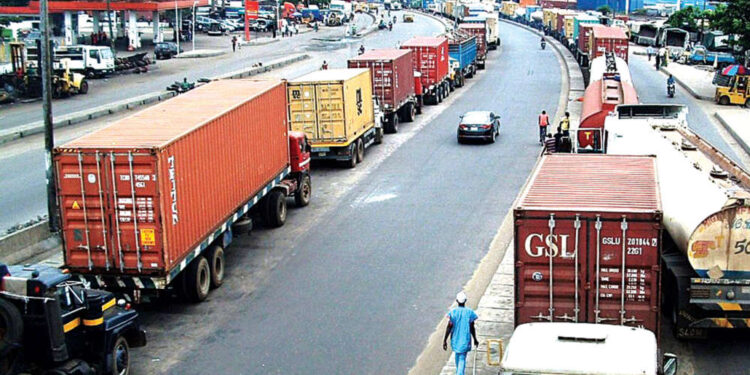Every day, the Lekki-Epe Expressway bears the weight of hundreds of articulated trucks ferrying cargo from key installations including the Lekki Free Trade Zone, Dangote Refinery, and the Lekki Deep Sea Port, along with other industrial and commercial facilities lining the corridor.
With only one major entry and exit route, the corridor has become a pressure point where a surge in industrial activities meets fragile infrastructure.
To prevent a major future traffic crisis similar to the one that plagued Apapa and Tin Can ports a few years ago, the Lagos State Government reintroduced its electronic call-up system on June 16, 2025, after suspending it in March.
First launched in September 2024, the system was designed to regulate the flow of trucks using a digital scheduling platform. The renewed effort is seen as a move to avoid a repeat of the gridlock that once crippled access to Apapa and Tin Can ports before reforms improved the situation.
What we know about Lagos’ e-call-up rollout on the Lekki-Epe corridor
The Lagos State Government revealed that between 360 and 400 trucks currently operate on the Lekki-Epe corridor daily. However, with increasing industrial activity from the Lekki Deep Sea Port, Dangote Refinery, the Lekki Free Trade Zone, and other major developments, that figure could climb to between 3,000 and 4,000 trucks per day, according to projections by the Ministry of Transportation.
This raises concerns that the corridor’s only major access road could become overwhelmed.
To manage this anticipated surge, the government reintroduced a structured electronic call-up system. Trucks are required to register on a digital platform (mycallup.com) and remain in one of seven designated holding bays until summoned electronically. Each truck must also carry a Radio Frequency Identification (RFID) tag to enable real-time tracking and enforcement.
- Unlike the system at Apapa and Tin Can ports—where the Nigerian Ports Authority (NPA) takes the lead—the Lekki corridor’s version is overseen by the Lagos State Government in collaboration with private sector partners.
- At the system’s initial rollout in September 2024, five holding bays were established across locations including Okorisan and Poka in Epe, as well as sites near the Dangote Refinery and HFP Brick Industry. By June 2025, the number of holding bays had grown to seven.
- According to Lagos State Commissioner for Transportation, Oluwaseun Osiyemi, truck movement is restricted during peak traffic periods—between 5 a.m. and 9 a.m., and again from 6 p.m. to 10 p.m.—to minimize disruption to commuters.
- Enforcement is carried out by LASTMA, the Vehicle Inspection Office (VIO), the Police, and the Lagos Taskforce using RFID scanners to validate truck movement.
Initially, a N2,500 levy was charged per truck to support infrastructure and logistics. However, during the June 2025 relaunch, the fee was raised to N12,500—sparking backlash from groups such as the Independent Petroleum Marketers Association of Nigeria (IPMAN), the Maritime Workers Union of Nigeria (MWUN), and the National Association of Road Transport Owners (NARTO).
How the e-call-up system works in practice
From conversations with stakeholders, it is clear that the system, at least in its early days, showed promise.
Chinedu Ukadike, National Publicity Secretary of the Independent Petroleum Marketers Association of Nigeria (IPMAN), told Nairametrics that the first rollout helped reduce friction between drivers and haulage operators.
“Trucks stayed in designated holding bays and only moved when summoned via the app,” he said.
“It made the process more orderly. You didn’t have to fight your way forward or pay to be called up first.”
He added that the initiative significantly reduced disputes and corruption in the corridor. “Before the system, it was who-you-know. Now, it’s who-is-called. That alone brought some peace.”
Ukadike explained that at the initial N2,500 levy, the program seemed reasonable and supported basic services like signage and maintenance. However, that goodwill began to erode when the fee jumped to N12,500 per truck in the June 2025 relaunch.
A pricey reset: Resistance from the road
On the day enforcement resumed, tensions flared over the new N12,500 fee required for trucks accessing the corridor. The Maritime Workers Union of Nigeria (MWUN) and the National Association of Road Transport Owners (NARTO) pushed back, calling the charge excessive and poorly communicated.
IPMAN instructed its members to boycott the corridor, warning that the increase could destabilize fuel distribution across Lagos.
“This new amount is arbitrary and risks increasing fuel pump prices,” Ukadike said.
However, the strike was short-lived. Two days after announcing the boycott, IPMAN suspended the action following a commitment from the Lagos State Government to begin negotiations.
Still, concerns remain over whether the levy reflects actual service improvements or is simply another financial burden. As of now, there has yet to be a resolution between the Lagos State Government, IPMAN, and other stakeholders on whether the N12,500 levy will be maintained, reviewed, or reduced.
Voices from the corridor: What residents are saying
For residents living along the Lekki-Epe corridor, the return of truck enforcement has drawn mixed reactions. While some worry about the potential for future gridlock, others say truck activity is not the main cause of the area’s congestion.
Asukwo Ndem, a resident who lives near the corridor, said traffic congestion tends to occur during peak hours but is not directly tied to truck movement. He noted that unlike the situation along the Apapa and Tin Can ports corridor in previous years, trucks on the Lekki-Epe axis generally do not park along the road or obstruct traffic.
“So far, truck movements haven’t disrupted my daily commute,” he said.
“Yes, there’s traffic, but it’s mostly due to the growing number of people and cars using the corridor for work and business.”
Immanuel Alabi, another resident, identified population growth and commuting patterns as the real pressure points on the road. He observed that traffic is usually intense between 7 a.m. and 9 a.m., especially on Mondays, Wednesdays, and Fridays.
“The trucks aren’t the main problem,” he said.
“The high number of private cars and minibusses is what causes most of the congestion, and that’s tied to the general population pressure in the state.”
Alabi added that while the BRT system operates along the corridor, it is not as reliable or consistent as in areas like Ikorodu, Ikeja, Egbeda, or Lagos Island where commuters can depend on it as a primary mode of transport. He believes a more efficient service in the area could help reduce the number of private cars on the road.
Expert view on the initiative
Transport systems researcher Tonami Playman, who spoke to Nairametrics, believes the state’s approach misses the point. His analysis focuses on the Lekki Deep Sea Port, which he identifies as a major generator of truck traffic along the corridor, but his insights reveal broader problems.
“From the onset, Lagos operated on the faulty assumption that gatekeeping truck entry and exit would solve congestion,” he stated.
“But you can’t coordinate your way out of inefficiency.”
- Playman argued that truck turnaround times are primarily influenced by the efficiency of cargo handling at the ports rather than surface-level scheduling systems. He noted that when port clearance processes stretch into double-digit hours due to manual paperwork and inspections, it becomes nearly impossible for truck operators to meet designated movement windows, making the call-up system ineffective on its own.
- He warned that unless the Lekki port bottleneck is resolved, congestion will spill over to the rest of the corridor and affect all the other industries operating in the area.
- He advocates for the digitization of cargo handling, the elimination of human-led inspections, and full automation. He pointed to the success of the Regional Electronic Cargo Tracking System (RECTS) used in East Africa, where turnaround times at Mombasa port now average seven hours.
“In Lagos, you still have people physically inspecting trucks, stamping papers, and creating backlogs. Fix that, and then your e-call-up becomes an asset, not a Band-Aid,” Playman noted.
He also stressed that any system trying to regulate movement must be backed by functional port operations. Otherwise, you’re managing symptoms, not curing the disease.
The wider context supports his position.
- According to the 2025 State of Africa’s Infrastructure report by the Africa Finance Corporation (AFC), only two African ports—Tanger Med in Morocco and Port Said in Egypt—rank among the world’s top 100 in efficiency.
- Tanger Med ranked 4th globally, while Port Said came in 16th, based on the World Bank and S&P Global’s 2023 Container Port Performance Index.
- The report highlights the persistent inefficiencies in African port systems, citing long cargo dwell times, poor hinterland connectivity, and underdeveloped logistics infrastructure as key challenges.
Despite rising cargo volumes and increased private sector investment, many African ports continue to rely on outdated systems that are poorly integrated with inland logistics. This has led to high costs, delays, and widespread congestion—issues Lagos must resolve if its traffic management reforms are to succeed.
Outlook
Lagos’ second attempt to manage truck traffic on the Lekki-Epe corridor highlights the challenge of keeping pace with rapid industrial growth. While the e-call-up system brings order, its success depends on more efficient operations at the Lekki Deep Sea Port.
- Around 400 trucks currently use the corridor daily, but that number is expected to rise as industrial activity expands. Dangote Refinery, already processing 650,000 barrels of crude oil per day, plans to begin fuel distribution in August using 4,000 CNG-powered tankers.
- The company had earlier proposed moving up to 75% of its fuel deliveries by sea to ports in Warri, Port Harcourt, and Calabar—a plan that could ease road pressure, though there’s been no recent update.
While residents say congestion is driven more by population growth and car use than truck movement, tensions over the N12,500 levy remain unresolved. The real test lies in improving port efficiency and scaling infrastructure before congestion becomes unmanageable.























